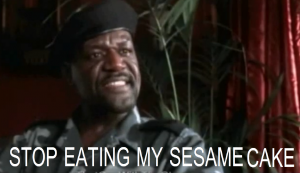As probably anyone reading this post knows, the movie was about slavery and, I think can be said definitively, the hypocrisy of the Romanians’ interactions with the Gypsy slaves. But before I go into my take on the film and an “exclusive interview” with one of the cinema’s ushers. I want to bring up some questions that were on my radar that I think are important to keep in mind while watching the movie: Why is the movie in black and white?, is that an allusion to how the characters view their world?, and lastly, why were the people in the theater laughing, is the movie really as funny as it seemed or is there something “funny” about the people with whom I was watching this movie?
For me the first few are easiest to answer because I think my second question is the answer to the first. They believe their world is black and white. The whole point of this movie—I think—is the “realization”, which I’ll call it for the sake of this post, the protagonists have: they are not the only sparks of fire in the world, a reference you’ll get if you watch the movie.
The film starts out on a funny note with a priest carrying on about the Romanian situation in a non-PC tantrum in the woods to which the father and son respond agreeably. With the father, Costandin, being sick, and running “errands” for Romanian masters with his son, Ionita, the man and his son are convinced they are the common men who bear the burden of society. Constandin preaches to his son that they must work hard and persevere in spite of their burdens, and promises to do well by his son…to make a man out of him. He has Ionita practice with his sword, presumably, to be used against slaves, gets his son to lose his virginity to a prostitute, and promises that he will make Ionita an officer. A big theme of the movie is how it ironically parallels a hero’s quest in spite of its characters being seemingly kind of lame. They have stereotypically backwards thinking, Constandin fails to please the same prostitute who claimed his son was a “bull” in bed, and the list goes on. Spoiler alert!!!!!!!! After bringing back the slave, thinking they have the power to object against his torture, Constandin is smacked and shooed away in front of his son, the slave is punished, and they walk away, unlike most hero’s quests, not with the reward but redrawn to their mission: to bear the burdens of the world, as they see it.
As I omitted earlier, I arrived late to the movie, so I talked to an usher afterwards to get what I missed in the first few minutes. Unfortunately I’ll have to paraphrase, but he put it pretty eloquently, “It’s a movie about who’s the master,” and because I feel like he used this word (sorry if I misspeak) it is about “nested” hierarchies.
The movie, I think for the “father & son duo” is about unveiling who the real man behind the scenes is and revealing who the real slaves are. The journey ends with, and I hope this analogy supports my last statement, the Matryoshka nesting doll, kind of man-behind-the-curtain, of realizations, and perhaps that is what made it so ironic, but funny I don’t know. The Polonius-esque babbling, amusing, but the backwards-thinking, while foolish-seeming in contrast to the more liberal-thinking here, funny? Watching pride be dampened by the inability to satisfy the same woman who had sex with your son, funny? Don’t know and right now can’t say.









